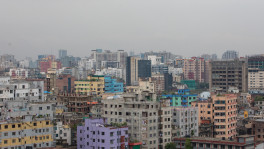Outsiders on bank boards, harm performance
A BIBM study finds these outsiders include business groups, entrepreneurs and politicians

Outsiders are dominating bank boards and influencing loan process as well as other operations, causing deterioration in the financial performance of banks, a study has found.
These outsiders include business groups, entrepreneurs and politicians, and they are appointing their own people in vital posts such as chairman, director and managing director to work for them.
The serious malpractice in bank boards was revealed in the study titled "Operating Governance in Banks: The Role of Board of Directors" in a webinar on Monday. The study was conducted by the Bangladesh Institute of Bank Management (BIBM).
The study said the Bangladesh Bank has experience in catching such directors, suspending their operations and penalising them.
Recently, the Bangladesh Bank appointed an observer in One Bank on the ground that the previous chairman, who is not in the board now, was interfering in board meetings by attending as an outsider.
This is not the only incident. A similar practice in other banks prompted the central bank to issue a circular on 12 November, restricting the presence of outsiders in board meetings.
Including the latest appointment of the observer in One Bank, there are 11 observers in commercial banks of Bangladesh.
The Bangladesh Bank appoints observers for failure of banks to maintain sound financial health.
The BIBM study found that appointment of observers is positively linked to the non-performing loans (NPL) of banks.
It also found that independent directors of banks, who are supposed to be put in the boards to ensure corporate governance and raise their voice for the sake of general investors, have been appointed from among directors' close friends and well-wishers.
They also worked as dummy independent directors, who work on the desires of sponsored directors or outsiders. Some of the independent directors are not competent enough to sit on boards.
Deputy Governor of the Bangladesh Bank SM Moniruzzaman agreed with the observation of the study on the interference of outsiders in the management of banks.
"The loopholes in the corporate governance mechanism in the respective banks, such as weakness in bank management and internal control mechanism, and involvement of some insiders in banks with borrowers and other third parties lead to operating governance failures in the banking sector," he said at the event organised on the BIBM premises to unveil the study findings.
He blamed weakness in board oversight and negligence as well as board members' involvement; nepotism and favouritism in the appointment, posting, promotion, and transfer of bank officials; inaction of respective boards to handle the situation; failure of the policy direction of bank boards; and greed, forgery and corrupt practices for the lack of good governance in banks.
The study was based on opinions of bank officials, and a six-member BIBM research team was involved in it. BIBM Associate Professor Dr Mohammad Tazul Islam presented the details of the study in the webinar.
The International Monetary Fund (IMF) recently raised concerns over a lack of governance in the boards of Bangladeshi banks. To ensure good governance in the financial sector, it called for increasing the number of independent directors in banks.
The organisation raised questions about faults in processing of licences of banks and financial institutions, not giving agricultural loans without land mortgage, and data quality of banks.
Ahsan H Mansur, executive director of Policy Research Institute, told The Business Standard the practice of outsiders' presence in bank boards is mainly due to political influence.
He opined that the central bank should intensify monitoring of such malpractices in the boards.
According to the study, 51% of bankers believe there is a dummy director in bank boards. Furthermore, 40% argued that the presence of dummy directors in boards reduces banks' performance.
A dummy director is a member of the board who acts and votes on behalf of a non-board member (outsider).
The study found that these dummy directors play a pivotal role in lending, human resources, and other operational activities of banks. They put tick marks on the board memo, selecting what should be placed and approved in the board. They have been instructed by outsiders to play a role in the board.
Also, there are dummy chairmen, dummy directors as well as dummy managing directors.
The study said although board members cannot be a member of any committee on employees' recruitment, promotion, transfer and other human resource activities, most of the human resource activities have been performed by the board.
Moreover, the chairman is not supposed to take interviews of employees for selection, but they are practicing this, which is against the law.
The study found that 56% of bankers agreed (including 17% who strongly agreed) that their boards influence the loan approval process.
The interviewees opined that boards fix the range of the loan as the approving authority, which should not be the case. This practice reduced independence of managing directors and chief executive officers of banks.
The study said 60% of bankers argued that there are undisclosed related party transactions (transactions with businesses or directors or their family members) in banks.
It said 57% of bankers agreed (including 16% who strongly agreed) that related party transactions reduce operational efficiency of banks.
The study found that bank boards are dominated by either business groups or family members or politicians and their friends and relatives.
Also, 71% of bankers agreed (including 20% who strongly agreed) that the presence of family members in boards does not increase board efficiency while 62% opined (including 20% who strongly agreed) that business groups in boards do not increase board efficiency.
Such malpractice by boards caused big loan scandals in the banking sector, including Hallmark, Bismillah Group, BASIC Bank, SB Group scams, etc.


 Keep updated, follow The Business Standard's Google news channel
Keep updated, follow The Business Standard's Google news channel
















